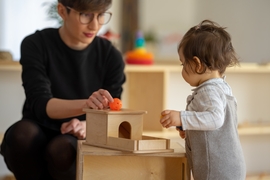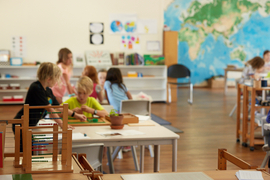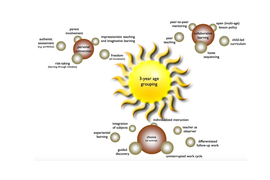
Parenting is one of the most rewarding and challenging roles we play as adults. Our society has high expectations of parents and yet we are not always able to access the resources we need to become the parent we want to be. Montessori can offer you a parenting framework from birth to maturity. It is more than an educational method; it is an approach to supporting the full development of your child.
The following are some simple things to consider about your primary school aged child…
The primary school aged child is very different from the child you have come to know during the pre-primary years. The primary school child is often less charming, less gentle and less accommodating. He is taller, leaner and socially, he is spreading his wings. He wants to make decisions, test limits and explore more widely. The primary school years are a time to enlarge the child’s field of action and experience beyond the family home. At this stage, the child may prefer being with friends rather than mum or dad. This is often a good time for the child to start participating in activities such as scouting, or joining in a sports club.
The pre-primary child learns much about his world through movement and physical exploration. The primary school child learns much about his world through mental exploration. This child is curious, eager to learn and has a thinking, reasoning mind.
The child’s intelligence can be thought of as a fertile field in which can be sown countless seeds. Intelligence and imagination go hand in hand for the primary school aged child. Imagination helps the child to make sense of the surrounding world. It helps him understand his place in space, both historically and in the present.
The questioning and wondering of the child aged six years and beyond supports his natural wholesome development. The child wants and needs to ask questions about the world, some of which may be challenging for parents to answer. The best responses to the child’s questions are concise and truthful answers offered with patience at the child’s level. If you don’t know the answer, it’s all right to say so and offer to support your child in his research.
The child of around six or seven years of age begins to turn toward the intellectual and moral sides of life. He is oriented toward ethical questions and wants to understand the ‘why’ of things. The primary school aged child is interested in making his own moral judgements and understanding the relationship between his acts and the needs of others. This sensitivity is a natural characteristic that often emerges as a desire to help those less fortunate. Offering opportunities to help others, supports the developing personality of the child at this stage.
Development takes time and we can provide the best support if we are prepared with knowledge and understanding. Helping the child to find his own way by himself is a wonderful role adults can play. Right from the beginning, our consistent expectations of appropriate behavior are a useful guide for the primary school aged child.



